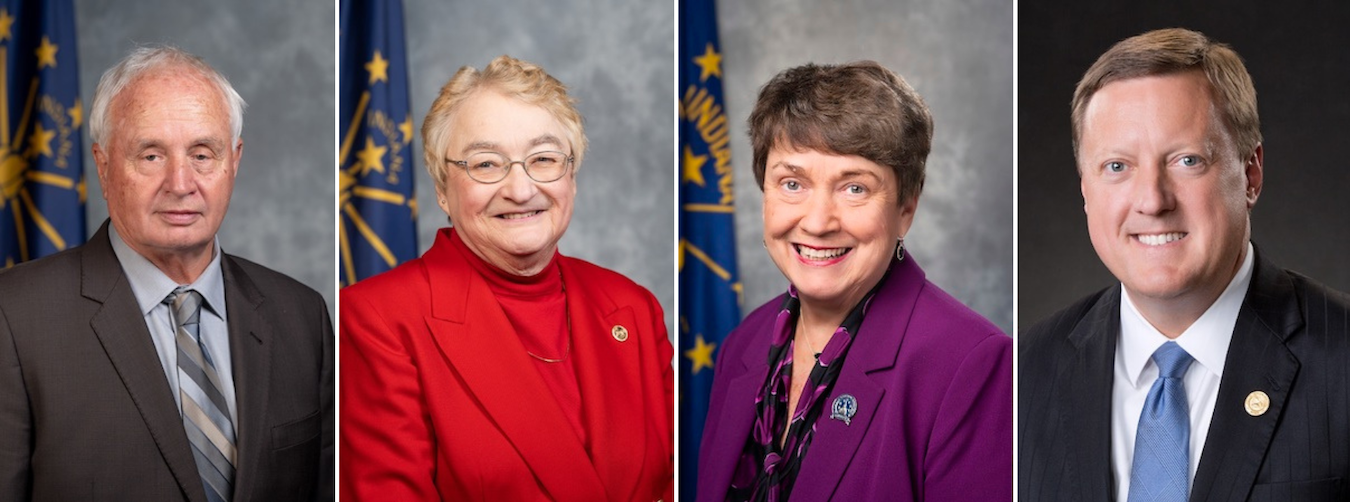Editor’s note: This is the second of two articles on lax ethics rules in the Indiana State Legislature. The articles are the result of a joint investigation between the Indiana Environmental Reporter and the Arnolt Center for Investigative Journalism at Indiana University. Limestone Post published the first article, “Lax Ethics Rules Could Create Conflicts of Interest for Indiana Lawmakers,” in July.
Indiana state law requires lawmakers and candidates for office to disclose financial interests from the previous year, but little in state law prevents legislators from introducing legislation that benefits them financially.
The investigation, which looked at data from 2019 to 2022, found multiple potential conflicts of interest on both sides of the aisle.
Statements of economic interest submitted by lawmakers in early 2023 indicate that financial links to bills introduced by lawmakers continued to exist in the latest legislative session, especially at crucial junctures in the lawmaking process.
Rewarding the gatekeepers

(top) Rep. Todd Huston, Indiana Speaker of the House; (bottom) Sen. Rodric Bray, president pro tempore of the Indiana Senate | Photos: iga.in.gov
Any member of the Indiana House of Representatives or Indiana Senate can sponsor a bill, but a bill in either chamber must pass through a series of gatekeepers in order to be considered by the full membership of that chamber.
In the House of Representatives, the first hurdle to overcome is the Speaker of the House. The Speaker decides whether a bill is referred to a committee for review or dies immediately.
Speaker of the House
Indiana Speaker of the House Todd Huston disclosed owning a consulting firm with clients currently unrelated to the environment. Huston’s campaign received tens of thousands of dollars in contributions from companies regulated by the state’s environmental laws that would benefit from less protective legislation.
Huston’s campaign received $564,000 in contributions to help with his reelection, including $10,000 from Duke Energy Corp.’s political action committee, $3,000 from American Electric Power, and $2,500 from NextEra Energy Inc.
Senate president pro tempore
In the Senate, the President Pro Tempore Rodric Bray decides whether a bill is referred to a committee or dies.
Bray reported that he had business interests in various utilities in Indiana and Michigan, including AES, parent company of AES Indiana; NiSource Inc., parent company of the Northern Indiana Public Service Co.; and Michigan-based Detroit Edison, now known as DTE Energy. Bray also reported that one of his children has a business interest in Duke Energy Corp.
Bray also received campaign contributions from regulated utilities and the fossil fuel industry, including $12,500 from NiSource, $10,000 from Duke Energy Indiana, $3,000 from American Electric Power (AEP), $2,000 from CenterPoint Energy Inc., $2,500 from Sunrise Coal LLC, and $1,250 from Alliance Coal LLC.
Neither Huston nor Bray denied any bill assignment to a committee in the 2023 session.
Committee chairs
Once bills are assigned to a committee, committee chairs decide whether or not to allow a bill to progress. A committee chair can decide not to schedule a bill for a hearing. If that happens, the bill is essentially dead.
Most environmental bills go through the committees on Environmental Affairs, Natural Resources, or Utilities, Energy and Telecommunications.
House committees

(top to bottom) Rep. Alan Morrison, chair of the House Committee on Environmental Affairs; Rep. Shane Lindauer, chair of the House Committee on Natural Resources; Rep. Edmond Soliday, chair of the House Committee on Utilities, Energy and Telecommunications | Photos: Indiana General Assembly website
House Committee on Environmental Affairs chair Rep. Alan Morrison reported being employed by the alarm and security company Mulhaupts and having no outside economic interests.
Morrison’s 2022 reelection campaign received contributions from Duke Energy, AES, AEP, and NextEra Energy totaling $1,600. His campaign also received $2,000 from trade groups associated with land development, like the Indiana Builders PAC, Indiana Multifamily Housing PAC, and Indiana Realtors Association.
Morrison’s links to the homebuilding industry drew scrutiny when he allowed Rep. Doug Miller, a real estate broker and member of the Indiana Builders Association, to introduce an amendment to an unrelated bill that sought to clamp down on the few remaining state protections for wetlands, just hours before the committee was set to vote on the bill. Morrison refused to delay voting on the bill, despite requests from several committee members. The bill passed committee, but the wetlands language was eventually scrapped during the legislative process.
House Committee on Natural Resources chair Rep. Shane Lindauer reported having being employed at an assisted living facility and having economic interests tied to assisted living facilities, but his 2022 campaign received $2,500 from building PACs and $1,600 from utility companies. The contributions amounted to nearly a quarter of Lindauer’s reelection contributions.
Lindauer co-authored a successful bill that exempted forestry operations, which provide some of the lumber used for homebuilding and industrial construction, from any regulation that required those operations from requiring waterway or watershed permits if the waterways do not have a watershed greater than 10 square miles. Prior to the new law, forestry operations needed a permit if they were along waterways with a drainage of at least 1 square mile.
The House Committee on Utilities, Energy and Telecommunications is chaired by Rep. Edmond Soliday, a retired United Airlines pilot and Army veteran who flew helicopter combat missions during the Vietnam War.
Soliday reported deriving more than 25 percent of his income from investments managed by a financial firm. His reelection campaign received $16,000 from utilities and coal companies, $10,500 from Realtors and homebuilders, and $3,500 from clean energy companies.
Soliday authored and sponsored more than a dozen bills associated with the environment, including several controversial bills that allow utility companies to pass on more costs to utility customers.
House Enrolled Act 1417 and Senate Enrolled Act 180 allow utilities to pass on the cost of coal ash cleanups and other business costs to customers, essentially shielding companies from the costs of past financial decisions. Soliday-authored bills also eliminated competitive bidding for electric transmission lines, allowed natural-gas-fired power plants to qualify for financial benefits reserved for clean energy projects and slowed the adoption of utility-scale battery systems for renewable energy by requiring the system owners to get construction approval from the Indiana Department of Homeland Security in addition to its usual permitting process.
Senate committees
The Senate Committee on Environmental Affairs is chaired by Sen. Rick Niemeyer, who reported holding an interest in his auction and realty service company. Niemeyer’s reelection committee received $4,500 from Realtors and homebuilders and $2,000 from energy companies.
As committee chair, Niemeyer decided not to hear a bill establishing guidelines for beneficial use of coal ash and prevented a vote on a bill establishing a climate solutions task force in the state.
Read more: Data from the Indiana Department of Environmental Management shows that hundreds of acres of Indiana wetlands have been destroyed since a 2021 law removed all state protections for Class I wetlands. —Indiana Capital Chronicle
The Senate Committee on Natural Resources is chaired by Sen. Susan Glick, an attorney from Lagrange with no reported economic interests. Glick’s reelection committee received $3,000 from BP North America Inc. and received $1,000 from forestry associations.
The committee’s ranking member, Sen. Jean Leising, received campaign contributions from ten separate utilities and energy suppliers totaling $8,850 and $2,000 from homebuilding PACs.
Leising introduced legislation that makes it more difficult for utilities to retire coal-fired power plants, eliminated a requirement for floodplain administrators to use “best floodplain mapping data” for construction permitting that she voted for the previous year, and co-authored a bill that would expand the number of small modular nuclear reactors that would qualify as a clean energy project in the state.

(l-r) Sen. Rick Niemeyer, chair of the Senate Committee on Environmental Affairs; Sen. Susan Glick, chair of the Senate Committee on Natural Resources; Sen. Jean Leising, ranking member of the Senate Committee on Natural Resources; Sen. Eric Koch, Bloomington attorney and chair of the Senate Committee on Utilities | Photos: Indiana General Assembly website
The Senate Committee on Utilities is chaired by Bloomington attorney Sen. Eric Koch. In his 20-page statement of economic interest, Koch has reported having hundreds of investments, including many in oil, gas, and related sectors, industries directly affected by Koch’s decisions as committee chair. Koch states that his are passive investments with no stock management participation, but his decisions could potentially be making him money.
Koch’s reelection committee has also received more than $24,000 in contributions from energy-related industries in 2022 alone.
Koch authored legislation benefitting fossil fuels and renewable energy in 2023.


